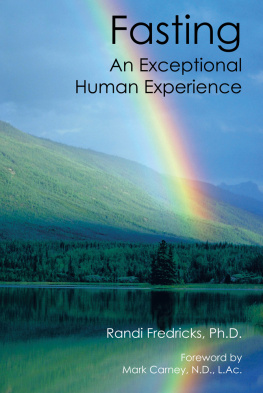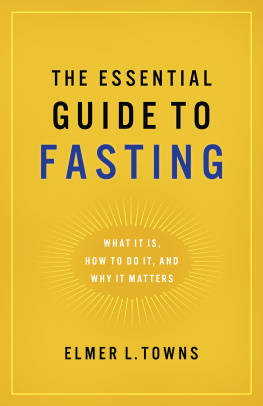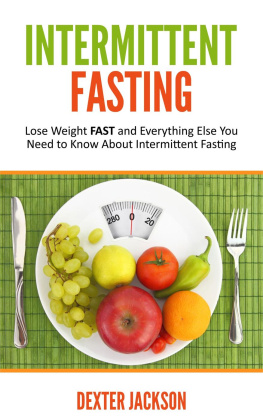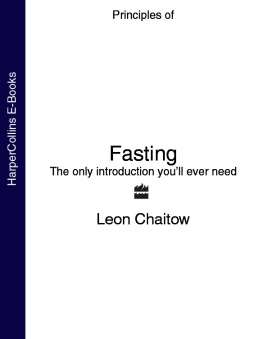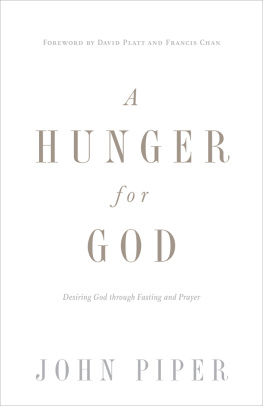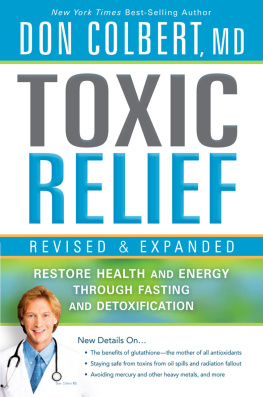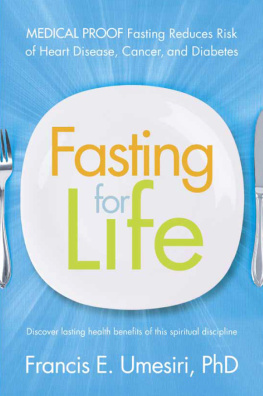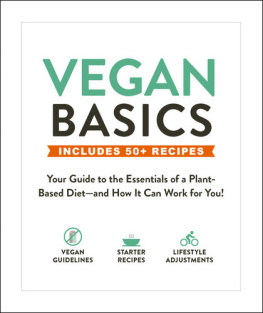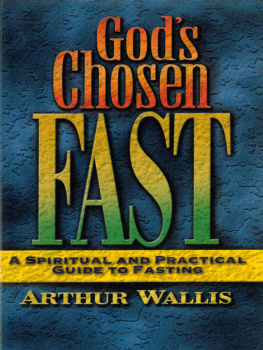Fasting:
An Exceptional Human Experience
Randi Fredricks, Ph.D.
All Things Well
Publications

Fasting: An Exceptional Human Experience
Randi Fredricks, Ph.D.
All Things Well Publications
San Jose, CA.
www.allthingswell.com
Phone: 1-800-957-5655
2013 by Randi Fredricks, Ph.D. All rights reserved.
No part of this book may be reproduced, stored in a retrieval system, or transmitted by any means without the written permission of the author.
First Edition
Published by AuthorHouse 12/14/2012
ISBN: 978-1-4772-9413-0 (hc)
Library of Congress Control Number: 2012923792
AuthorHouse
1663 Liberty Drive
Bloomington, IN 47403
www.authorhouse.com
Phone: 1-800-839-8640
Contents
Note
The contents of this book are not intended to be medical or psychological treatment or advice. Because everyone is different and some people are not capable of fasting safely, it is strongly recommended that anyone who wants to fast consult with his or her doctor first. Anyone currently or previously under the care of a mental health professional should consult with them prior to fasting. Furthermore, it is always best to remain under a doctors close medical supervision throughout a fast as well as the adjustment period afterward.
Dedication
To my mother and father, Virginia and Edward
Everyone fasts. Thus, whether you know it or not, you are a student of fasting. Just like you, I am a student of fasting, too. I absolutely love the topic of fasting and in essence have dedicated my life to studying it. Personally, I have fasted many times and in many different ways for many different reasons. I have apprenticed with some of the worlds leading fasting experts, such as Dr. Alan Goldhamer and Dr. Joel Fuhrman, and I have supervised many people during their fasts. Ive written articles, conducted research, and presented at various medical conferences on the subject matter. Having spent the better part of more than one decade of my life scouring both the published medical literature as well as the lay literature on the topic of fasting, I came upon a startling discovery one afternoon in the spring of 2010 while surfing the Internet: Someone had done more fasting research than I! Someone actually loved the topic of fasting more than I. How was this even possible? I was impressed.
Enter Dr. Randi Fredricks. What I had stumbled upon were several articles she wrote on the topic. I read them all. They inspired me to learn moreto dig even deeper. I was shocked and thought, How is it that I had not come across her work before now? I picked up the phone and called her. When we spoke, she was about to start her landmark study examining the antidepressant effects of fasting, a study that became the focus of her doctoral dissertation. At one point, we discussed the concept of collaborating on a book about fasting. Dr. Fredricks and I eventually met in-person on August 21, 2010, in Santa Rosa, California, at the National Health Associations annual convention, featuring world renowned fasting experts Drs. Alec Burton and Keki Sidwha. I still remember how incredible it felt to be in the presence of these masters. And yet, somehow my notion of writing a new book on fasting seemed to eclipse my awe of these giants and took center stage in my thoughts. While my personal and professional life precluded me from pursuing such a project, Dr. Fredricks single-handedly and passionately plugged away at the goal. She painstakingly collected and compiled the fascinating information that you are about to read in the pages that follow.
Fast-forward two years. Dr. Fredricks managed to write the most comprehensive, up-to-date text yet available on fasting. In this book, and for the first time anywhere, Dr. Fredricks has presented a scholarly and encyclopedic review of the many facets of fasting, truly from a physical, mental, emotional, spiritual, and historical perspective. Leaving no stone unturned, she has collected countless writings and research from literally all around the world. There are various aspects about the topic of fasting that can be quite complex, and Dr. Fredricks covers each of them with ease, completely referenced: the history, the physiology, the religious and spiritual details, political fasting, what the current research shows, what effects fasting has on the psyche, and so much more. Her commitment to fasting is a testament to her passion and dedication to the subject matter. And she walks the walk, routinely fasting. Since our meeting in 2010, I have come to know Dr. Fredricks well. We sometimes call or email each other, sharing our excitement when one of us has unearthed an old study or come across a new article on fasting.
Fasting is more than a practice that is used for achieving profound psychological and medical benefits. The secret I have learned about fasting is this: It opens up a window into virtually every aspect of our health and our humanity, such as promoting our wellness, extending our lives, preventing future illnesses, treating existing diseases, taking a stand on political matters, and perhaps most importantly, creating an opportunity to witness the great mysteries that life offers us. So, who is this book for? Remember, everyone fasts. Therefore, this book is for everyone, whether you are a student, a clinician, a researcher, a historian, a politician, a public health official, or are simply just curious and want to learn more about your health. We all can benefit greatly from reading this book. Reading it, you will see how fasting has shaped history, civilizations, world religions, our culture, our bodies, our health, and our daily lives. I thank Dr. Fredricks for her successful Herculean efforts of weaving an ancient tradition with modern science and over 200 years worth of information (plus a pinch of common sense) into a beautiful in-depth book, and remaining true to the roots of the tradition. Long before you read the last page, I am confident you will agree that fasting truly is an exceptional human experience.
Mark Carney, N.D., L.Ac.
Contributing Author, Foundations of Naturopathic Medicine Textbook President, Your Healing Place, Denver, Colorado
Fasting is a fiery weapon. It has its own science.
No one, as far as I am aware, has a perfect knowledge of it.
MOHANDAS GANDHI (2001/1961, p. 58)
As a psychotherapist, I often talk with people who have sacrificed self-care in lieu of other activities, usually work related. Many of them have either abandoned a spiritual practice or never had one. In these instances, part of my work is encouraging the development of such a practice.
It seems nowmore than everpeople struggle to find meaning and significance in their lives. Buddhist teacher and psychotherapist Jack Kornfield (2001) said, We live in disordered times, complicated, distracted, and demanding Whether in prayer or meditation, in visualization, fasting, or song, we need to step out of our usual roles, out of the busy days on automatic pilot (p. 26).
Just as there are different reasons for fasting, there are several definitions. Psychiatrist Len Sperry (2001) said fasting is used as a means of weight loss, detoxification of the body for medical purposes, or as a spiritual practice. When performed as a spiritual practice, fasting is defined as abstention from food for the purification of ones motivation. All the great spiritual traditions recognize its merits (p. 154).
Definitions of fasting tend to overlook its enormous power. Annemarie Colbin (1986) described its wide-reaching effects:
Perhaps no where is the power of food more evident than when food is abstained from. Entire religions have evolved from one mans fast, empires toppled, wars halted. For examples we need look no further than Jesus, Muhammad, the Buddha, Gandhi. (p. 257)
Next page
